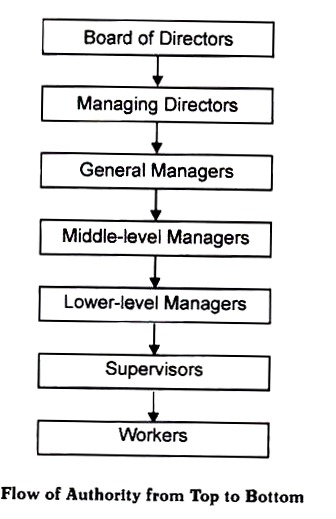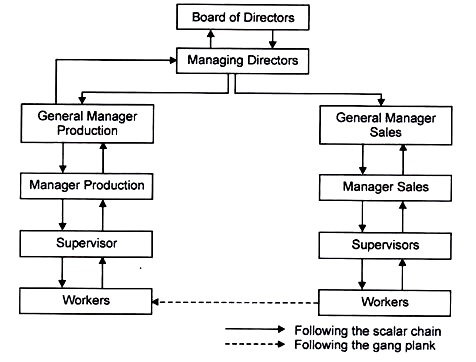This essay throws light upon the top fourteen principles of management according to Henry Fayol. The principles are: 1. Division of Labour 2. Authority and Responsibility 3. Discipline 4. Unity of Command 5. Unity of Direction 6. Subordination of Individual Interest to General Interest 7. Remuneration 8. Centralisation 9. Scalar Chain 10. Order 11. Equity 12. Stability of Tenure 13. initiative 14. Esprit De Corps.
Principle # 1. Division of Labour:
It means breaking the work into smaller units and assigning each unit to different individuals. Rather than performing the whole task alone, each individual performs only part of the task assigned to him. Performing the same task over and over again leads to specialisation and increases efficiency of organisational performance.
For example, a job is divided into 3 units: 1, 2 and 3. In organisation A, the same worker performs the three units and in organisation B, worker A performs unit 1, worker B performs unit 2 and worker C performs unit 3. Organisation B adopts the principle of division of labour.
Principle # 2. Authority and Responsibility:
Authority means “the right to give orders and the power to exact obedience.” Managers enjoy authority (right to give orders) by virtue of their position. They cannot, however, command obedience unless official authority is supplemented with personal expertise and knowledge.
ADVERTISEMENTS:
Responsibility means moral commitment to do the work assigned. It is the obligation to perform the assigned task to the best of one’s ability. There must be parity between authority and responsibility. They go hand-in-hand. In order to discharge responsibility, one must have authority commensurate with responsibility.
For example, if sales manager has to increase sales (responsibility), he must have the authority to design sales strategies like redesign the products, increase expenditure on advertisement or hire more people in the sales department etc. Unless allowed to do so, increase in sales may not be possible.
Principle # 3. Discipline:
Discipline means respect for rules and agreements.
This can be brought through:
ADVERTISEMENTS:
(a) Effective leadership, guidance and motivation,
(b) Good supervision at all levels,
(c) Clear and fair agreement with employees, and
(d) Giving rewards for achievements and punishments for non-compliance to rules.
ADVERTISEMENTS:
People should be disciplined not only because it comes from official authority but also because they feel it is important. It should be self imposed and people should feel committed to their leaders.
Principle # 4. Unity of Command:
It refers to one boss for one subordinate. Each employee should receive orders from one boss only. This helps in holding the workers responsible to their boss. In case they receive orders from more than one boss, it is likely that they would not be able to carry out instructions of either of them.
It will result in conflict of instructions and confusion about whose instructions hold priority over others. This is also likely to delay action on the part of subordinates. Unity of command helps in fixing responsibility, avoids conflicts and develops harmonious relationships amongst superiors and subordinates.
Principle # 5. Unity of Direction:
There should be one boss for one set of operations having the same objective, e.g., all operations related to finance should be grouped in finance department headed by the finance manager. It refers to one head for same set of activities.
ADVERTISEMENTS:
All operations having the same objective are placed under one plan, usually one department. This department or plan should receive instructions from one manager only. Personnel manager shall frame policies for recruitment, selection, training and development for all the departments working throughout the organisation. All activities related to personnel shall be placed under direct guidance of personnel manager. This principle refers to “one head for one plan”.
Principle # 6. Subordination of Individual Interest to General Interest:
People work for their individual interests but the organisation appoints them for organisational interests. Though fulfillment of organisational objectives leads to satisfaction of individual objectives, yet if there arises a clash between individual and organisational goals, individual goals should not take precedence over organisational goals. Organisation is a group of people and every person should individually contribute his best towards the organisational goals.
Organisational goals are primary and individual goals are secondary. In the event of any controversy, individuals must surrender their goals in favour of organisational goals. However, management should also have fair agreement with the subordinates to satisfy their individual interests. If employees are satisfied, they do not overpower the general interest.
Principle # 7. Remuneration:
Remuneration means compensation for work done by employees. A good organisation has a fair system of remuneration. Equal pay should be paid for equal work. For additional output, additional payment should be paid in the form of bonus or higher wages. A fair system of remuneration keeps employers and employees satisfied and both work to promote organisational interests.
Principle # 8. Centralisation:
ADVERTISEMENTS:
It means reservation of authority at top levels. An organisation where authority and power are retained at top organisational levels is a centralised organisation. When the authority and power are delegated to lower levels, it is said to be decentralised.
According to Fayol, “Everything that goes to increase the importance of the subordinates’ role is decentralisation, everything, which goes to reduce it is centralisation.” Organisations should maintain balance between centralisation and decentralisation, though it is difficult to ascertain when to centralize and when to decentralize.
There is more of centralisation in a small-sized organisation and more of decentralisation in a large-sized organisation. Fayol believed that managers should retain final responsibility for organisational tasks but also delegate authority to enable the subordinates to perform their tasks smoothly and efficiently.
Principle # 9. Scalar Chain:
It refers to the line of authority or chain of command moving from top to the bottom most level of the organisation.
ADVERTISEMENTS:
A usual representation where authority flows in a line is as follows:
This chain must be respected for solving routine and non-routine problems. It is also known as hierarchy of authority. All orders flow from top to bottom and suggestions and complaints flow from bottom to top. Though effective, it becomes time-consuming for information to flow through scalar chain.
If two employees of different departments, say production and sales, wish to communicate with each other, they will have to follow a long chain if principle of scalar chain is respected. This chain should be followed if information to be communicated has to be necessarily brought to the notice of managers at different levels. If not necessary, some of the links of the chain may even be dropped. Information can flow directly between people of different departments at the same level.
ADVERTISEMENTS:
This flow of information between people of the same level is called ‘Gangplank’ by Henri Fayol He suggests use of this method where communication has to be speeded up and activities of the two units are not disjointed, Le., it serves to fulfill the purpose of coordination between the two units.
This flow of information can be diagrammatically represented as follows:
Principle # 10. Order:
It means “A place for everything and everything in its place.” Everything refers to all resources, human and non-human. People and materials should be in the right place at the right time. It is necessary for materials to be at the right place in order to smoothen the flow of production. Order for materials means material order.
Jobs must be assigned to people according to their abilities and skills. Once appointed, people should be placed at jobs they are most suited for. This will help in getting maximum out of their potential and effective conversion of inactive inputs into active outputs. When human beings are kept at the right place (right man at the right place), it is social order and when non-human or material resources are kept at the right place, it is material order.
Principle # 11. Equity:
Employees must be treated equally and fairly. Managers should not favour some and dis-favour others. Similar treatment should be given to similar employees. If managers are friendly and fair to employees, employees will also be loyal and dedicated to the superiors. They will work with full commitment and inspiration and contribute positively to organisational goals. Equity or concern for each other develops cordial and harmonious relationships in the organisation.
Principle # 12. Stability of Tenure:
ADVERTISEMENTS:
Once placed at particular job positions, people must stay there for a fairly long period of time to get known to that job environment. If they are transferred or rotated to other jobs frequently, they would not be able to understand the requirements of any of the jobs and, therefore, perform below their potential.
Stability of tenure, thus, implies that employees and managers should hold their respective positions for a period long enough for them to do justice to their jobs. Too much of shifting will negatively affect efficiency of the organisation.
Principle # 13. Initiative:
It means ability to originate or begin things. Subordinates should have freedom to initiate plans. They should frame and implement plans to solve problems arising at their work place. They should think of new ways of doing things. Initiative to take action will develop employees to their fullest potential and they will become active contributors to organisational goals.
Participative decision-making, that is, allowing employees to take part in decision-making processes promotes initiative of employees. It develops their potential to work and provides them job satisfaction. Initiative is the freedom to use their zeal for thinking of new ways to work. Employees should be given the discretion to do the work.
Principle # 14. Esprit De Corps:
‘Unity is strength’. People should work as a team to enjoy the benefits of synergy. It means loyalty to the body of members. Loyalty towards group can be strengthened through team spirit. Team spirit gives a sense of unity and workers collectively work as a group towards organisational goals. It develops harmony and understanding of organisational activities and motivates people to improve individual and organisational standards of performance.
The principle of ‘Esprit de Corps’, derives the benefits of synergy. Synergy means the combined output of workers as a group is more than their output as individuals (one plus one makes eleven). This principle builds harmony, mutual understanding, team spirit, unity of action, sense of belongingness towards the organisation and, thus, effective contribution to organisational goals.

